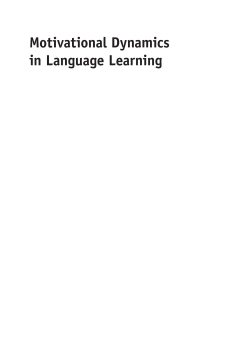
BOOK
Motivational Dynamics in Language Learning
Zoltán Dörnyei | Dr. Peter D. MacIntyre | Alastair Henry
(2014)
Additional Information
Book Details
Abstract
This landmark volume offers a collection of conceptual papers and empirical research studies that investigate the dynamics of language learning motivation from a complex dynamic systems perspective. The contributors include some of the most well-established scholars from three continents, all addressing the question of how we can understand motivation if we perceive it as continuously changing and evolving rather than as a fixed learner trait. The data-based studies also provide useful research models and templates for graduate students and scholars in the fields of applied linguistics and SLA who are interested in engaging with the intriguing area of examining language learning in a dynamic vein.
Zoltán Dörnyei is Professor of Psycholinguistics at the School of English, University of Nottingham. He has published widely on various aspects of second language acquisition and language learning motivation including Motivation, Language Identity and the L2 Self (2009, edited with Ema Ushioda).Peter D. MacIntyre is Professor of Psychology at Cape Breton University, Canada. He has published widely in the areas of the psychology of communication, motivation, emotion, willingness to communicate, language acquisition and dynamic systems.Alastair Henry teaches at University West, Sweden and has a PhD in Language Education from the University of Gothenburg. His research focuses on motivation in third language learning and gender differences in L2 motivation.
The edited volume is bound to become a recognized source of reference, inspiration, insight, reflection and self-education for all those who set their sights on uncovering the intricate nature of motivation to learn additional languages, whether with respect to its causes, intensity or the factors responsible for shaping it. Its merits will undoubtedly be appreciated by undergraduate, graduate and doctoral students, experienced scholars who feel the need to apply a wider lens to their research, one that is more focused on the individual, context or interactions between the two, as well as teachers who are determined to gain a greater understanding of the factors impinging upon motivation in the hope of devising efficacious motivational strategies.
Mirosław Pawlak, Adam Mickiewicz University, Kalisz, Poland
This pioneering volume brings together an impressive collection of studies on the applications of dynamic systems theory to the research of language learning motivation. Its strengths lie in offering new theoretical perspectives and groundbreaking methodological tools in researching motivation in various contexts. This book will prove to be a valuable and stimulating resource for anyone interested in the complex interplay of context, individual learner characteristics and processes of second language acquisition.
This anthology provides a much-needed bridge between conventional and dynamic approaches to L2 motivation research, and it is an important step toward a more complete understanding of the motivational ebbs and flows of language learning.
Aaron Doyle, The University of Hong Kong
The book is, without doubt, an important contribution not only to MLL directly but as an example of how CDST can be successfully applied to a particular area of research, also to applied linguistics, not to mention to other social science disciplines it has yet to touch. The book deserves to be read widely and with an open mind.
Roderick E. Mitcham, Kyoto Sangyo University, Japan
Table of Contents
| Section Title | Page | Action | Price |
|---|---|---|---|
| Contents | v | ||
| Contributors | ix | ||
| Foreword | xv | ||
| 1 Introduction: Applying Complex Dynamic Systems Principles to Empirical Research on L2 Motivation | 1 | ||
| Part 1 Conceptual Summaries | 9 | ||
| 2 Ten ‘Lessons’ from Complex Dynamic Systems Theory: What is on Offer | 11 | ||
| 3 Attractor States | 20 | ||
| 4 Rates of Change: Time scales in Second Language Development | 29 | ||
| 5 Initial Conditions | 38 | ||
| 6 Context and Complex Dynamic Systems Theory | 47 | ||
| 7 Human Agency: Does the Beach Ball Have Free Will? | 55 | ||
| 8 Social Network Analysis and Complex Dynamic Systems | 73 | ||
| 9 The Dynamics of Possible Selves | 83 | ||
| 10 ‘Directed Motivational Currents’: Regulating Complex Dynamic Systems through Motivational Surges | 95 | ||
| Part 2 Empirical Studies | 107 | ||
| 11 Motivation on a Per-Second Timescale: Examining Approach–Avoidance Motivation During L2 Task Performance | 109 | ||
| 12 Dynamics of the Self: A Multilevel Nested Systems Approach | 139 | ||
| 13 Changes in Motivation, Anxiety and Self-efficacy During the Course of an Academic Writing Seminar | 164 | ||
| 14 Motivation, Emotion and Cognition: Attractor States in the Classroom | 195 | ||
| 15 Once Burned, Twice Shy: The Dynamic Development of System Immunity in Teachers | 214 | ||
| 16 Learner Archetypes and Signature Dynamics in the Language Classroom: A Retrodictive Qualitative Modelling Approach to Studying L2 Motivation | 238 | ||
| 17 ‘I Can See a Little Bit of You on Myself’: A Dynamic Systems Approach to the Inner Dialogue between Teacher and Learner Selves | 260 | ||
| 18 Understanding EFL Learners’ Motivational Dynamics: A Three-Level Model from a Dynamic Systems and Sociocultural Perspective | 285 | ||
| 19 The Dynamics of L3 Motivation: A Longitudinal Interview/Observation-Based Study | 315 | ||
| 20 Study Abroad and the Dynamics of Change in Learner L2 Self-Concept | 343 | ||
| 21 Self-Regulation in the Evolution of the Ideal L2 Self: A Complex Dynamic Systems Approach to the L2 Motivational Self System | 367 | ||
| 22 The Dynamics of L2 Imagery in Future Motivational Self-Guides | 397 | ||
| 23 Conclusion: Hot Enough to be Cool: The Promise of Dynamic Systems Research | 419 |
